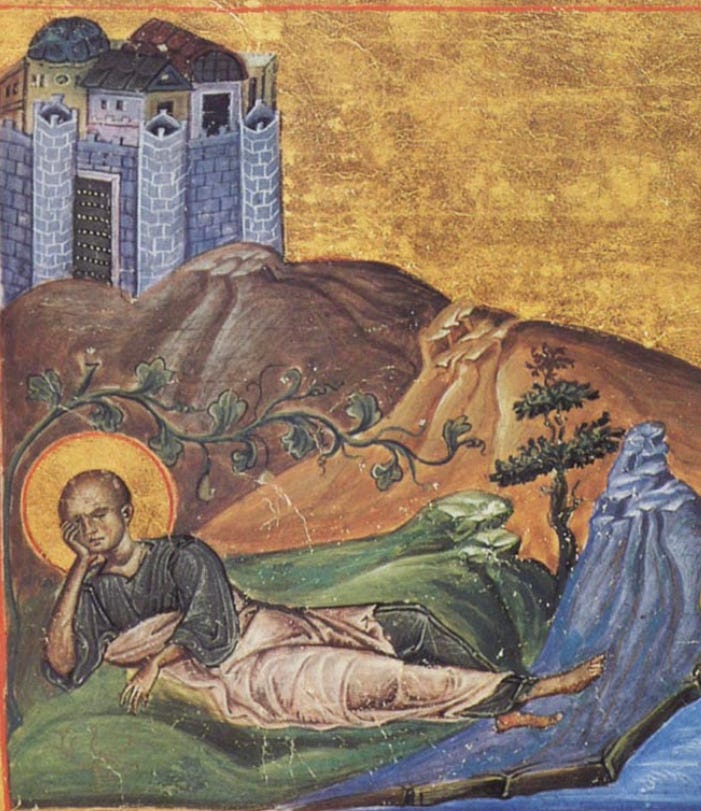Jonah: Worm and Plant
After Jonah sees the whole of Nineveh repent, he complains to God. He asks to die.
Jonah 4 v 2-3
He prayed to the Lord, “Isn’t this what I said, Lord, when I was still at home? That is what I tried to forestall by fleeing to Tarshish. I knew that you are a gracious and compassionate God, slow to anger and abounding in love, a God who relents from sending calamity. Now, Lord, take away my life, for it is better for me to die than to live.”
He then leaves the city and makes himself a shelter. God allows a leafy plant to grow up over him and bring shade from the bright Sun.
Overnight, God allows a worm to chew through the plant and it withers. This exposes Jonah to the early morning Sun and he gets burnt. And once again Jonah asks to die.
God then says, ‘What right have you got to be angry about the plant?’
Jonah responds by saying for a third time, he wants to die.
Leaving Paradise for a Thorny Shelter
Jonah leaves the city, the place God filled with His presence. He leaves towards the East. In a similar way, Adam and Eve’s decision causes them to leave Paradise eastwards.
Jonah builds a shelter. The word used here for shelter has the same root as the word for a thicket. The thicket reminds me of the thorns outside of the Garden of Eden.
Jonah symbolically enters the wilderness and sits amongst thorns and briars. He chooses to leave God’s presence because he can’t understand why God would show mercy to the Gentiles, especially ones who have caused so much death and destruction. It seems so unfair.
An interesting point to make is how when Jonah fled from God’s presence, he went Westward. And after the repentance of Nineveh, he flees Eastward. He goes from hiding in a boat on the sea, to hiding in a shelter in the wilderness. Wherever we go, we can’t hide from God.
Gracious to the Gentiles
In Jonah 4, God shows grace to Jonah and allows a plant to cover him from the burning sun.
Equally, God gives grace to Nineveh. Even though they are part of the most evil of empires. In fact, he prospers them. They soon become the capital of the Empire. God’s inclination is to show compassion and give people a chance to repent.
A worm was then allowed to eat through the stalk of the plant and it withers, exposing Jonah to the heat of the Sun. God will then choose when to end an Empire. All in His time.
God is teaching Jonah the lesson from Job. God gives and He takes away. He has a plan and purpose for everything in creation. And humans need to trust Him.
The Prophecy About the Kingdom of Judah
We can look at the symbolism of Jonah 4 and see a possible prophecy directed towards the Kingdom of Judah.
At the time of Jonah, Israel had split into two, the Kingdom of Israel and the Kingdom of Judah. Judah was made up of two tribes (Judah and Benjamin) and Israel included the rest. Jerusalem was in Judah.
If we look at the symbolism in Jonah 4.
Jonah 4 v 6 - 8
Then the Lord God provided a leafy plant and made it grow up over Jonah to give shade for his head to ease his discomfort, and Jonah was very happy about the plant. But at dawn the next day God provided a worm, which chewed the plant so that it withered. When the sun rose, God provided a scorching east wind, and the sun blazed on Jonah’s head so that he grew faint.
God relates the plant to Nineveh in verse 11.
The worm symbolises death. We see a reference to death and worms in the New Testament.
Mark 9 v 47 - 48
Thrown into Hell where, “ ‘the worms that eat them do not die, and the fire is not quenched.’
I believe Jonah represents the Kingdom of Judah, the Sun represents God’s judgement and the Wind from the East are the Medes and the Neo-Babylonians.
God’s judgement was about to burn the Kingdom of Judah.
But Nineveh repented, and it became the capital of a newly invigorated Neo-Assyrian Empire. This meant that the collapse didn’t happen for another century or so. But, when it did fall, it was very quick. Much like the plant in Jonah 4. It suddenly withered.
Then the Neo-Babylonians took over the Empire and eventually conquered Jerusalem in 586 BC.




